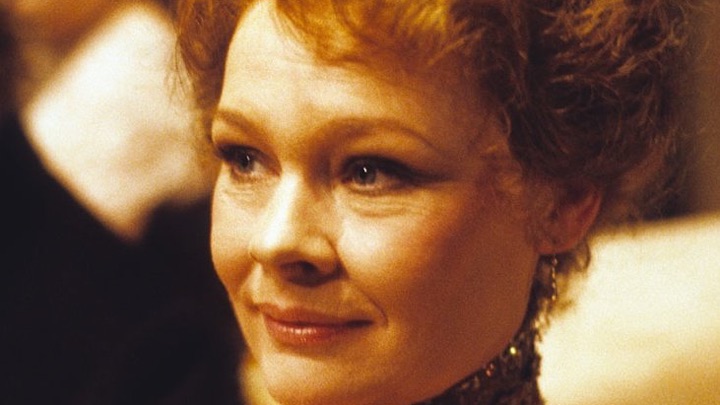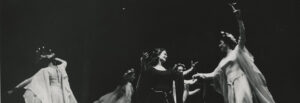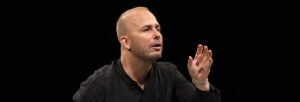
Having just watched and written about the famous Actors Studio Three Sisters, it also feels right to turn now to The Cherry Orchard—Chekhov’s final play—in a production from the BBC. So interesting to look first at a production which, for better and worse, preserves a legendary American style, theatrically speaking, we’re now in literally a different world.
Cameron Kelsall: Indeed, and I would characterize this production (aired in 1981) as an exemplar of a certain British approach to Chekhov. It nicely balances emotional connection with a sense of class and style, a mixture that works well for these plays, which are so grounded in a certain social milieu. It’s not the most famous filmed English assumption of The Cherry Orchard—that would probably be the production from the early ‘60s, with Peggy Ashcroft and John Gielgud—but it more than gets the job done. And Dame Judi Dench, Anya to Ashcroft’s Ranevskaya, graduates to the leading role herself here.
DF: Agreed that this was highly satisfying. That probably shouldn’t have been a surprise. With this cast—Dench, as you’ve mentioned, but also Harriet Walter, Anton Lesser, Bill Paterson, Anna Massey (and that’s just some of the most famous names), plus director Richard Eyre—there’s an obvious pedigree. But that can be a problem, too: too much “star luster.” Plus I’m a bit suspicious generally about British-ified Chekhov, which for American audiences tends to bestow an instant sense of classiness, which again isn’t always helpful. But this time, I think it all works, and is often exhilaratingly irreverent.CK: Much of the production’s success rests with Dench’s virtually ideal Lyubov Andreyevna. When we spoke the other day, you mentioned Ashcroft’s matronly take on the role—certainly a contrast to her salacious personal life—and that’s the kind of performance that comes to my mind when I think of British Chekhov. Sexy and sinewy, Dench is the exact opposite—a believable courtesan, a hot-blooded aristocrat and a little-girl-lost, sometimes all in the same breath.
DF: Exactly. Dench’ sexiness is one of several revelations in this performance, because I think it’s not necessarily where you’d expect her to be so strong. (Sidebar: Cameron, I know that we both saw Mary McDonnell as Ranevskaya here in Philly—the way her performance reinforced the glamour and connection with her Parisian lover was a real game-changer for me in understanding this character.) Dench’s justly celebrated, unmistakable speaking voice is employed here with special virtuosity—from growling to tinkling, with that little “catch” that’s so utterly bewitching. One more comment: she manages the quiet talking-to-herself moments—something I think rarely works on film—with consummate skill.
CK: And she has a worthy adversary in Paterson, who avoids the trap of playing Lopakhin as a crass arriviste. His entreaties to Lyubov to sell the cherry orchard for summer dachas comes across not in a bullying way, but as a genuine measure of help. When he finally bursts into the third-act ball to announce his own acquisition of the estate, it’s not boastful—he almost seems in disbelief. That adds a poignant layer to the moment.DF: I also liked Paterson a lot. The Scottish-ness takes a bit of an adjustment for an American viewer, but it works. I always think it’s interesting to see how Lopakhin’s working class origins and “otherness” are depicted in various productions.
CK: That’s a very good point. In the past twenty years, I’ve seen very few American productions that don’t cast Lopakhin as a person of color.
DF: I also want to put in a word Suzanne Burden as Anya. She’s not an actor I knew before, but I thought she was terrific. She’s quite far removed from the traditional coltish ingenue—she’s a bit gawky and awkward, and (like Dench) presents the character as notably self-centered. It really works.
httpvh://youtu.be/E72A1GoW548
CK: Dench and Burden are nicely paired—vain and short-sighted, but not hateful. The similarities in their style nicely balances Walter’s stern, religious Varya. I do think Walter (a truly superb stage actress) occasionally pushes the character’s self-abnegation to the line of parody, but she mostly keeps on the right side of overstatement. The abortive “proposal” scene between her and Paterson is gutting.
DF: And all the more powerful because Dench—who has given us some tearful moments earlier—plays it instead with a sort of grim “well, that’s that” acceptance. (As so often, Dame Judi makes surprising actor choices which enliven even the most familiar moments.) I adore Walter, here and pretty much everywhere. I also want to tip my hat to Anna Massey’s Charlotta, a delicious turn that would not be out of place in the Kit Kat Klub!
CK: Massey is a delight—I’m sure we’ve both seen our share of tedious takes on that character. Eyre deserves credit for putting together an ensemble in which every member offers a deeply individuated take on their role and works together with absolute cohesiveness.
DF: “Cohesiveness” is such an important point, I think—and one so rarely found in Chekhov productions. After all, these are plays about family, though in many cases you wouldn’t know it. I’ll also point out that Eyre’s Cherry Orchard really makes sense of the notion that the plays are (or at least, were in Chekhov’s terminology) comedies. Strasberg’s Three Sisters, apart from some awkward ensemble attempts at levity, clearly dwelt on misery. Here, the emotional landscape is far more volatile and ever-changing: “smiling through tears,” just as it should be.
httpvh://youtu.be/R1VzxuQZEN4


